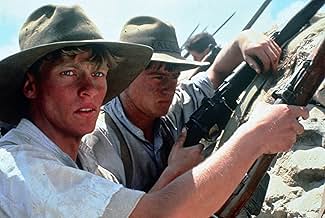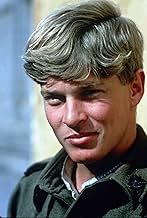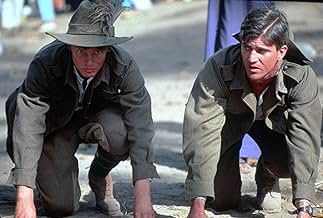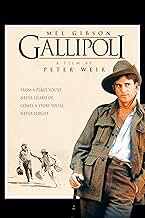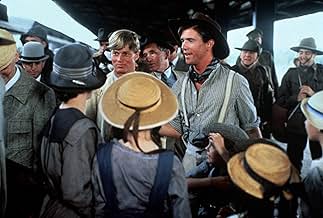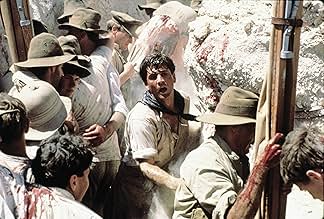IMDb रेटिंग
7.4/10
44 हज़ार
आपकी रेटिंग
दो ऑस्ट्रेलियाई धावकों को युद्ध की क्रूर वास्तविकताओं का सामना करना पड़ता है जब उन्हें तुर्की में गैलीपोली अभियान में लड़ने के लिए भेजा जाता है।दो ऑस्ट्रेलियाई धावकों को युद्ध की क्रूर वास्तविकताओं का सामना करना पड़ता है जब उन्हें तुर्की में गैलीपोली अभियान में लड़ने के लिए भेजा जाता है।दो ऑस्ट्रेलियाई धावकों को युद्ध की क्रूर वास्तविकताओं का सामना करना पड़ता है जब उन्हें तुर्की में गैलीपोली अभियान में लड़ने के लिए भेजा जाता है।
- पुरस्कार
- 11 जीत और कुल 6 नामांकन
Charles Lathalu Yunipingu
- Zac
- (as Charles Yunupingu)
फ़ीचर्ड समीक्षाएं
Filmed in a period of cinematographic transition, between, on the first hand, the old Hollywood productions like The Longest Day (Ken Annakin and 4 others, 1962), A Bridge Too Far (Richard Attenborough, 1977) or The Great Escape (John Sturges, 1963) sometimes completely disconnected from the reality and the atrocities perpetrated on the battlefield by both sides and, on the other hand, darker and immeasurably more realistic productions from the late 70s, such as Come and See (Elem Klimov, 1985), The Deer Hunter (Michael Cimino, 1978), Das Boot (Wolfgang Petersen, 1981) and Le vieux fusil (Robert Enrico, 1975).
Indeed, if the first part of this movie is of a distressing insouciance, the two main protagonists striving to leave Australia to join the peninsula of Gallipoli, Turkey, like two children expecting their next summer camp, the second part is cold and raw, unbridled and cruel. In this respect, the film is appropriately lulled by the album Oxygène (Jean-Michel Jarre, 1976) for the sequences full of hope and carefree, camaraderie and friendship and the adagio of Albinoni (Remo Giazotto, 1945) for the poignant sequences of courage and sacrifice.
A moving film with a neat realization and an excellent cast.
Indeed, if the first part of this movie is of a distressing insouciance, the two main protagonists striving to leave Australia to join the peninsula of Gallipoli, Turkey, like two children expecting their next summer camp, the second part is cold and raw, unbridled and cruel. In this respect, the film is appropriately lulled by the album Oxygène (Jean-Michel Jarre, 1976) for the sequences full of hope and carefree, camaraderie and friendship and the adagio of Albinoni (Remo Giazotto, 1945) for the poignant sequences of courage and sacrifice.
A moving film with a neat realization and an excellent cast.
I watched "Gallipoli" on a whim one night when it aired on TCM as part of a tribute to Australian cinema, and found it to be a moving film about the ultimate horror and waste of World War I.
Mark Lee and Mel Gibson play two young sprinters who meet as competitors, become friends, and then enlist together in the war. Not taking much seriously, they both think serving will be a bit of a lark, and indeed it begins that way, with a lot of carousing, drinking, whoring and some goofball antics during combat training. But then they arrive at their destination, and the reality of what war actually looks and sounds like begins to sink in.
This movie does a great job of showing that transition from young man bluster and naive belief in the good of a cause to scared everyman, being sent out to certain death for reasons he can no longer comprehend. The film is paced very well, and the trench warfare scenes at the film's end are so expertly juxtaposed with the buddy movie that precedes them, that the effect on the audience is that of a punch to the groin. The very end is devastating and haunting in a way few movies anymore would have the guts to be.
Peter Weir directed this before he became known for more popular and Oscar-baity films like "Witness" and "Dead Poets Society."
Grade: A
Mark Lee and Mel Gibson play two young sprinters who meet as competitors, become friends, and then enlist together in the war. Not taking much seriously, they both think serving will be a bit of a lark, and indeed it begins that way, with a lot of carousing, drinking, whoring and some goofball antics during combat training. But then they arrive at their destination, and the reality of what war actually looks and sounds like begins to sink in.
This movie does a great job of showing that transition from young man bluster and naive belief in the good of a cause to scared everyman, being sent out to certain death for reasons he can no longer comprehend. The film is paced very well, and the trench warfare scenes at the film's end are so expertly juxtaposed with the buddy movie that precedes them, that the effect on the audience is that of a punch to the groin. The very end is devastating and haunting in a way few movies anymore would have the guts to be.
Peter Weir directed this before he became known for more popular and Oscar-baity films like "Witness" and "Dead Poets Society."
Grade: A
A "Johnny Turk" here, as they say in the movie, just watched the movie and I am very much under the effect of it. I loved the movie, I think they portrayed the senselessness of the war very effectively without making any side the villain. As obvious to anyone watching the movie, the Australians were the victims in the truest sense of the word. They died so needlessly for a cause that was not their own. When I was a kid my mother would always tell me that they were tricked into joining the war thinking they would get to see Europe. So the sentiment in Turkey about Australians and New Zealanders has been favoring them. It was never "what were they doing here!!!! :@" but it was "what were they doing here :(((((" and we love it that Australians still care so much that they come back to visit the land every year in scores whereas I am ashamed to say I haven't been to Gallipoli yet. One thing not so obvious from the movie is that just as it was not the Australians' war to fight, it was not the Turks' war to fight either. In the movie they keep referring to the Ottoman Empire as Turkey. It may seem small but it is a crucial difference because the very reason that Turks took part in the war was because some blind ottoman officers could not face the truth, couldn't see that Ottoman Empire was living its final days and they were blinded by the prospect of the "good old days" that they had to drag the country down with their grandiosity complex.
Ataturk was in Gallipoli. After everything he said these words that have been embraced by the Turks towards our Anzac brothers: "Those heroes that shed their blood and lost their lives... you are now lying in the soil of a friendly country. Therefore, rest in peace. There is no difference between the Johnnies and the Mehmets to us where they lie side by side here in this country of ours... You, the mothers who sent their sons from far away countries, wipe away your tears. Your sons are now lying in our bosom and are in peace. After having lost their lives on this land, they have become our sons as well."
Ataturk was in Gallipoli. After everything he said these words that have been embraced by the Turks towards our Anzac brothers: "Those heroes that shed their blood and lost their lives... you are now lying in the soil of a friendly country. Therefore, rest in peace. There is no difference between the Johnnies and the Mehmets to us where they lie side by side here in this country of ours... You, the mothers who sent their sons from far away countries, wipe away your tears. Your sons are now lying in our bosom and are in peace. After having lost their lives on this land, they have become our sons as well."
"Gallipoli" is a great little war film that is rarely mentioned, but one that can certainly stand up to the likes of "Saving Private Ryan" and movies of the big budget blockbuster kind. It tells the story of Archy (Mark Lee), a young Australian runner, and Frank Dunne (Mel Gibson), another runner. Both of them have great potential as runners, and they meet at a race where Archy beats Frank. Archy is running off to join World War I, and when it is revealed at the enlistment office that he is underage, Frank takes him to Perth to sign up there. Frank has no intention of joining the war, because he doesn't want to die for a cause that isn't really an Australian one. (An early Mel Gibson movie that takes an anti-British stance) Eventually he decides to join, and the rest of the story follows the two men in their various encounters throughout the war.
The story is well told, focusing on the development of the two main characters rather than battle sequences. The two contrast each other. Frank is worldly, and cynical, not ready to die for a foolish cause, while Archy is naive and idealistic. It is an excellent study the way the two personalities react to the war.
"Gallipoli" will rarely be mentioned in the same breath as most of the most famous war movies, but it is certainly one of the best at revealing the humanity that exists at the front lines. It is a well made film, and an extremely moving story.
The story is well told, focusing on the development of the two main characters rather than battle sequences. The two contrast each other. Frank is worldly, and cynical, not ready to die for a foolish cause, while Archy is naive and idealistic. It is an excellent study the way the two personalities react to the war.
"Gallipoli" will rarely be mentioned in the same breath as most of the most famous war movies, but it is certainly one of the best at revealing the humanity that exists at the front lines. It is a well made film, and an extremely moving story.
There is not a lot wrong with this movie. The entire thing seems authentic - meaning you feel like you're in Australia in 1915. You are living on a farm, running in a race and ultimately in a war.
What is also very extraordinary is that there is not really a lot that happens, there is barely a plot. But it doesn't matter, because Peter Weir is a master storyteller. The actors are all superb and your heart may hurt at the climax - mine did.
Unforgettable, like all great movies.
What is also very extraordinary is that there is not really a lot that happens, there is barely a plot. But it doesn't matter, because Peter Weir is a master storyteller. The actors are all superb and your heart may hurt at the climax - mine did.
Unforgettable, like all great movies.
क्या आपको पता है
- ट्रिवियाAlthough he is wears an AIF uniform, Colonel Robinson is often mistaken for an Englishman because he has a clipped Anglo-Australian accent, typical of the time.
- गूफ़The Battle of the Nek was not a diversion for the British landing at Suvla, it was a diversion for an attack by New Zealand attack on Sari Bair.
- भाव
[first lines]
Jack: What are your legs?
Archy Hamilton: Springs. Steel springs.
Jack: What are they going to do?
Archy Hamilton: Hurl me down the track.
Jack: How fast can you run?
Archy Hamilton: As fast as a leopard.
Jack: How fast are you going to run?
Archy Hamilton: As fast as a leopard!
Jack: Then let's see you do it!
- साउंडट्रैकAdagio in G Minor for Strings & Organ
Composed by Tomaso Albinoni
Performed by Orchestre de Chambre Jean-François Paillard
R.C.A. Records
टॉप पसंद
रेटिंग देने के लिए साइन-इन करें और वैयक्तिकृत सुझावों के लिए वॉचलिस्ट करें
विवरण
- रिलीज़ की तारीख़
- कंट्री ऑफ़ ओरिजिन
- भाषाएं
- इस रूप में भी जाना जाता है
- Galipolje
- फ़िल्माने की जगहें
- Gallipoli Beach, Coffin Bay, South Australia, ऑस्ट्रेलिया(setting: Anzac Cove)
- उत्पादन कंपनियां
- IMDbPro पर और कंपनी क्रेडिट देखें
बॉक्स ऑफ़िस
- बजट
- A$26,00,000(अनुमानित)
- US और कनाडा में सकल
- $57,32,587
- दुनिया भर में सकल
- $57,38,604
इस पेज में योगदान दें
किसी बदलाव का सुझाव दें या अनुपलब्ध कॉन्टेंट जोड़ें


